Text
instagram
Click the picture to read the whole thread.
By Alok V. Menon
7 notes
·
View notes
Text
Like, people who identify as Queer know the word is used like a slur. Trust me, we know.
So when we say “queer is a slur” was started by terfs, maybe use some critical thinking and try to understand what we mean. That is, if you actually care about queer people and the damage terfs do, rather that just screaming “queer is a slur!” and ignoring the actual point.
Terfs did not like that queer was reclaimed. End of. This is a fact. Queer was too broad, too accepting, and embraced all the people they wanted gone. And I know y'all exclusionists feel the same but get pissed when we point it out so you deny it, but sit down and listen for a minute.
Queer was the preferred term for poc. For bisexuals. For trans people. For people with multiple identities. It neatly encapsulated everything, and was a friendly community to those who felt thrown under the bus by mainstream LGBT activism. It was a political and social statement, “you treated my like I was different and weird, and guess what? I am and that’s something to be proud of.”
So the response? “You can’t use that word. Its bad. Its a slur.”
And at the time, a lot of people rolled their eyes. Everyone knew why they didn’t like the word and brushed that off. It was fine.
So they started more subtly. “Just so you know this word is very harmful and is a slur so be careful how you use it :))) in case you didn’t know :)))) its a slur :))) friendly reminder :))) for the sake of other people of course :))))” type shit on every post involving the word, including and especially posts simply mentioning self identification.
Always worded in friendly, concerned ways, like the derailment was meant to be nice and considerate, and not about normalizing their rhetoric.
And what happened because of that was a younger generation of community kids growing up with these statements being thrown at them and absorbed on every. Single. Post. That. Mentionioned. Queer.
The result? That same generation of kids cutting it all short, removing the meant-to-be-palatable niceness, to just say “queer is a slur.”
Exactly how it was originally intended. “Queer is a slur.” People drop on posts where young queer people talk about it being a self identifier that actually fits them. “Its a slur,” they comment, with nothing else, on posts they clearly didn’t read past that word, written by people twice their age who had reclaimed it before they were even born.
Its nasty. Its disgusting. It’s plain old bigotry, whether the people saying know it or not. It is a terf tactic, plain and simple.
And no one wants to deny that it is indeed used as a slur (right along with all the rest of our identities.) No one wants to be insensitive and force it on people who haven’t reclaimed it.
But invading queer people’s posts to spit “queer is a slur” is flat out queerphobic. You do the dirty work of terfs, of cis straight oppressors, by saying in one simple sentence: “its a dirty word, there is no pride in it, you haven’t/can’t reclaim(ed) it.”
And regardless of your actual intentions, when you do this, that is EXACTLY what you are communicating and doing.
“Queer is a slur” is a terf movement. Stop fucking supporting terfs just because you want to pretend like it isn’t.
139K notes
·
View notes
Note
hey! could you explain some of the history behind the stud identity?
stud is a black lesbian identity, much like AG (aggressive). though it is similar to butch in describing female masculinity, and stud/fem often mirrors butch/femme roles — it illustrates their unique relationship to womanhood by recognizing the specific ways in which they are subjected to, and impacted by, racism, homophobia, and misogyny due to historical constructions of black gender roles and perceptions of black female masculinity.
some historical information and excerpts about the meaning and evolution of stud identity:
in 1965, ethel sawyer conducted “a study of a public lesbian community” in st. louis, missouri. this was the earliest known sociological study of a black lesbian community anywhere in the united states. in this fieldwork, sawyer found that masculine black lesbians in the midwest referred to themselves as studs.
anita cornwell writes “the butch, who in all black gay circles that i have ever encountered is labeled ‘stud’” (from “a black lesbian is a woman is a woman…”, published in the los angeles free press, november 1972)
lorraine bethel references “the black bulldyke stud” in her poem “what chou mean we, white girl? or: the cullud lesbian feminist declaration of independence (dedicated to the proposition that all women are equal, i.e. identical/ly oppressed)”. (published in bethel & smith, 1979)
susan, in an interview about female prisoners, uses the term “stud broad” to explain “women who from physical appearance might easily be mistaken for men … contrary to the images in homophobic research and media … they are often unusually quiet and gentle … [she] sometimes won’t allow herself to be touched.” (from “sex is always the headliner”, published in sinister wisdom no. 16, 1981)
oshen t. explains “i identify as stud but, growing up, i didn’t know that there was a word, ‘stud.’ what was more common was butch, but at some point, like in my mid to late teens, i noticed that butches were usually white women, and even though i did see some black butches … at some point it got really irritating and didn’t fit me. i don’t feel butch, and i don’t like that word, even saying it. stud came out of me and my peers having a conversation, and i held onto that word stud. we younger studs from east oakland started to gravitate toward that. butch was white and older, and as young kids, we were studs. there was some age stuff, race and class. all the books were about stone cold butches … just white people. we were like, nah, that’s not us.“ (quoted in “masculine of centre, seeks her refined femme” by b. cole, published in persistence: all ways butch and femme, 2011)
b. cole writes “unlike white female masculinity, female masculinity for womyn of colour is based on sites of power and systemic oppression — through masculinities of colour. the assumption that they can be resignified with equal subversive and revolutionary actions against white manhood is false. the ability to access masculinity pivots upon the ways in which gender intersects with race, and these gaps have been filled with new ways of naming ourselves. in the last decade, the explosion of young masculine-of-centre womyn has created a demographic shift on the butch landscape, giving way to terms like ‘stud’, ‘boi’, ‘tom’, and ‘macha’ in california and the south, ‘dom’ within the d.c., maryland and virginia region, and ‘aggressive’ or ‘AGs’ in new york.these identities represent a redefined female masculinity that is rooted in the experiences of womyn of color and is more genderqueer than historical interpretations of butch……the emergence of this new language would not have happened were it not for the ways in which masculine-of-centre womyn of colour live their female masculinity through the lens of race. our identity has socially transformative powers and there are still nuances to our identities — masculine-of-centre mothering, social mobility, and historical racial oppression — which shape masculinity in ways that have yet to be fully explored…*womyn here is used to reflect that, for many of us, as masculine of centre, our gendered identity is not accurately reflected in the term women.” (reprinted in outside the XY: black and brown queer masculinity, 2016)
nneka onuorah said “black women don’t have a voice — black ‘AG’ [aggressive] lesbians don’t have a voice. i wanted to tell a story of my own for people who look like me.” (from an interview with NBC news about her film the same difference, 2015)
some films of interest:
the aggressives, directed by daniel peddle, 2005
pariah, directed by dee rees, 2011 (netflix)
stud life, directed by campbell x, 2012 (amazon)
the same difference: gender roles in the black lesbian community, directed by nneka onuorah, 2015 (kanopy)
7K notes
·
View notes
Link
24 notes
·
View notes
Photo



The Digital Transgender Archive (DTA)
Welcome to the Digital Transgender Archive! This site was created to make transgender history accessible for anyone wishing to learn more. Whether you’re a researcher, student, or just someone curious about trans history, the DTA is for you!
…Based in Worcester, Massachusetts at the College of the Holy Cross, the DTA is an international collaboration among more than fifty colleges, universities, nonprofit organizations, public libraries, and private collections. By digitally localizing a wide range of trans-related materials, the DTA expands access to trans history for academics and independent researchers alike in order to foster education and dialog concerning trans history.
The DTA uses the term transgender to refer to a broad and inclusive range of non-normative gender practices. We treat transgender as a practice rather than an identity category in order to bring together a trans-historical and trans-cultural collection of materials related to trans-ing gender. We collect materials from anywhere in the world with a focus on materials created before the year 2000.
You can dive right into the DTA or check out these links to start exploring:
DTA Starter’s Guide
Race & Ethnicity Research Guide
Search by Map
Global Terms
Art by Cricket Press.
2K notes
·
View notes
Link
[Image Description: Women of many ages stand at a barbed wire fence. They are all bundled in winter coats, hats, and gloves. The image is bleak.]
Support Making Queer History on Patreon
Send in a One-Time Donation
Email Making Queer History: [email protected]
Follow us on:
Pinterest, Twitter, Instagram, Facebook
248 notes
·
View notes
Link
“Scholars of the brain are fond of saying “what fires together, wires together,” which refers to the brain’s tendency to form neural networks (pathways in the brain that form certain thought, feeling and behavioural responses) that become stronger and stronger every time they are used. Trauma theory holds that traumatized inviduals — and, I would hypothesis, queer and trans community as a whole — have well-worn neural networks shaped around the deeply held physical sensation that we are constantly in danger, that we are bad and unloveable, that others are untrustworthy and violent. Every time we are abused, discriminated against or neglected, those neural networks become stronger, while our neural networks associated with safety and loving relationships atrophy. We become physically less capable of imagining a world where being with others is not synonymous with being unsafe.”
Read the whole thing.
6K notes
·
View notes
Text
I think that it’s important to direct your anger at your abusers and the core of abuse and your pain, because mostly people are too scared to be angry at directly what’s hurting them, and then simply redirect that anger at someone more vulnerable, someone more easy to be angry at, someone they can easily hurt and get away with. It’s something I’m scared that I myself might do, because I get massively furious at minor offenses and I have to keep myself in isolation until I calm down because I don’t want to be taking out my anger at someone who didn’t deserve it (or maybe they deserved just a little bit and I want to pull their guts out).
Abusers often manage to seem invincible, terrifying and generally like someone you can’t afford to be angry at, or like it’s unreasonable and hopeless to be angry at them. Most often you can’t really express your anger directly at them, it’s too risky and they would take it as an excuse to torture/kill you, so it can be very tempting to just take out your anger at someone who isn’t nearly as scary or dangerous to be angry at, and sometimes this can happen even without you realizing because your anger gets re-directed automatically, but listen, you need to be aware of where you’re directing your anger and why, and I know it’s hard to handle anger, especially if it’s pent up and you can’t really process it properly or control what it does. You’ll get better at it the more you keep processing it.
All of the anger you have inside you is there for a reason, and the only way to actually get rid of it is to direct it straight at your abusers. You don’t have to express it directly at them if it’s too dangerous or impossible, but when you’re too angry, be angry at them, rant about them, write revenge stories with them inside, stab their picture, stab anything pretending it’s them, punch shit pretending it’s them, but have them in your mind and rage until your anger is set free. That is how you hold an abuser responsible. And that is the way your guilt is going to melt and you’ll be left with clarity over what was done to you, and who is responsible for it.
483 notes
·
View notes
Photo


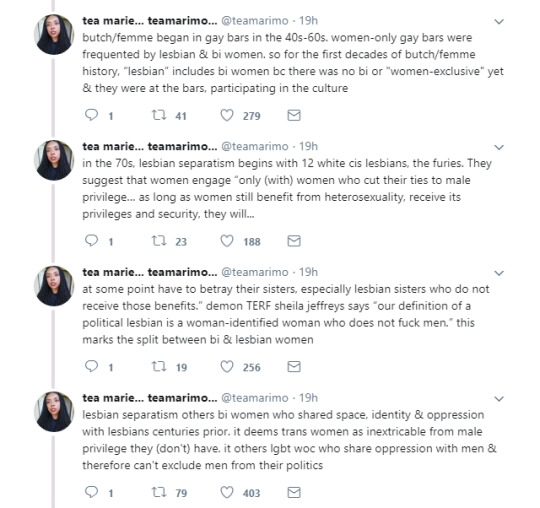
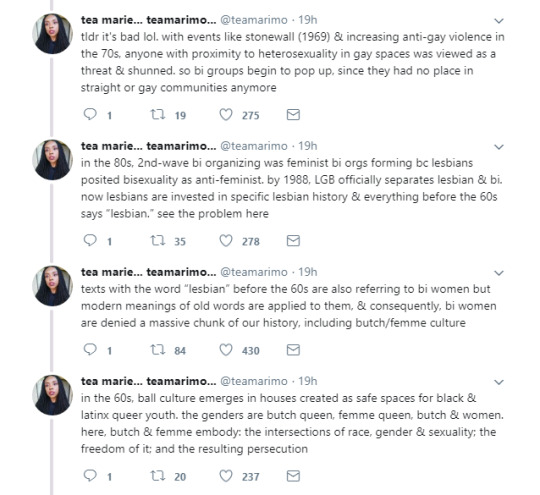

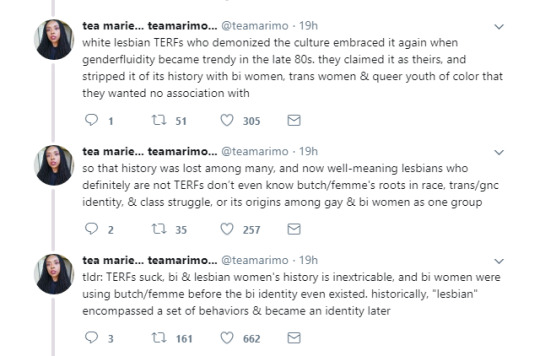


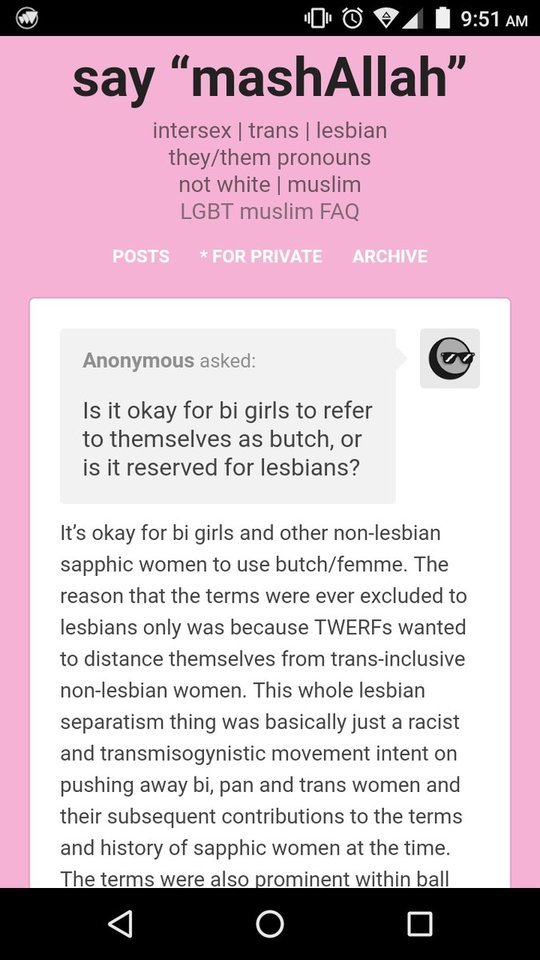

idk if this has been posted yet but i read this thread by @teamarimo and found it SUPER interesting and thorough and thought it’d be good to share it
42K notes
·
View notes
Note
Normally I'd just go to google but I haven't been able to really find anything other than vague references to it, but is there someplace to go for about information on PCOS being an intersex condition? Or a tag that you or someone else has on it? I just got diagnosed and the idea that I could be considered intersex because of it is weirdly relieving and reassuring to me? But I feel awkward about just claiming it bc i don't have a lot of the more obvious visual stuff like hair growth.
PCOS is recognized on a research level as being in the same category as all other DSDs, regularly appearing in research about any and all hyperandrogenic disorders. However, there is a vested societal interest in limiting the number of “intersex people” to an absolute minimum.
This means taking people who are demonstrably intersex–that is to say, people whose anatomy, including their internal anatomy like hormone balances, does not match the traditional expectations of their assigned gender–and telling them that they are not intersex. This is explicitly because it benefits particular classing systems in our culture.
One common example of this fuckery is the constant debate about who gets to participate in women’s athletics. Because the population of people with PCOS is so massive, acknowledging PCOS as intersex–which it is–would mean acknowledging all intersex variations as welcome in women’s sports. This would make it more difficult to gatekeep exceptional athletes who are disliked by their supervisory bodies, such as black and brown women like Caster Semenya and Dutee Chand or trans women like Tia Thomson and Tiffany Abreu.
In short, people don’t want to admit PCOS is intersex, because it would mean weakening the overall hold the gender binary has on a lot of systems. The current definition of a woman for a great many classifications, for example, is “someone with free testosterone of below 3.0ng/dl.” About a third of people with PCOS fit that limit.
Roughly 3% of the human population has PCOS. Roughly 2% of all human beings on earth have a hormonal condition that plants them firmly outside the current definition of perisex women. Admitting that PCOS is (usually, at least) an intersex condition means admitting that the intersex population isn’t 2% of the world, it’s actually 4%.
That’s a massive increase. And that kind of massive increase in a population of marginalized people recognizing their marginalization is a risk. Even if only a minute fraction of them decide to revolt, to demand better rights and better treatment, that’s a fucking threat.
This sounds very conspiratorial, so let me just ease it up a little.
There’s no secret organization trying to hold down intersex people.
But there is a persistent desire from medical and political groups to gatekeep the definition of intersex or to eliminate the intersex identity entirely. To get rid of a unifying term for us all, and treat us instead as a fractured, disparate collection of unrelated diagnoses who just so ~happen~ to have eerily similar political and social experiences by coincidence.
The primary way this is done is by treating “intersex” as a disgusting or archaic term that should be removed from the popular consciousness. If that disgust cannot be instilled, then the backup methodology is to make intersex a dangerous term that only people who have sufficiently proven their worthiness can approach.
But there is no proof, there’s no way to show that you “count.”
In the words of ISNA, “nature doesn’t decide where the category of “male” ends and the category of “intersex” begins, or where the category of “intersex” ends and the category of “female” begins. Humans decide.”
And it benefits the structural inequalities we all operate under, for humans to decide that PCOS doesn’t count, even while deciding that numerically it must. Socially it must. But if we just say, over and over, “but it doesn’t count, though” then that will make it rational.
Of course, there is also the fact that most people with PCOS are women, and there’s a persistent problem with recognizing women’s identities, particularly when there’s a medical tie-in.
But it’s not a problem unique to things associated with women. For example, getting hypospadias recognized as an intersex variation has been a similar uphill battle.
It’s actually interesting to compare these two most common intersex variations–hypospadias and PCOS–because they are in many ways inverse.
Hypospadias is usually limited to genital development, whereas PCOS usually impacts only hormone and gonadal development. Yet, people will say hypospadies isn’t intersex because there’s no hormonal or secondary sexual element, and that PCOS is not intersex because there is “only” a hormonal and secondary sexual element.
In comparison, my diagnosis of OT-DSD/”true hermaphroditism” can quite easily present with neither genital nor hormonal differences, only gonadal. The same can be said of a great many intersex variations.
The only reason it’s hard to find data about PCOS’s patently obvious state as an intersex variation is because there is a political agenda preventing such. However, if you set aside the specific term “intersex” and instead focus on less politically charged terms like “hyperandrogenism,” you can find a fair bit of academic research into the fact that PCOS has all the same social and physical hallmarks in common with other conditions recognized as intersex.
God, this really didn’t answer your question at all, and I’m very sorry about that.
Also, please don’t google “is pcos intersex” or anything like that, because literally all you will get is TERFs. They’ve latched onto that line of thought and are using it to prove that trans people are delusional. The popularized it a couple of years ago, and now searching “intersex” and “PCOS” in combination just absolutely buries you in TERF shit.
1K notes
·
View notes
Text
The big difference between liberal LGBT identity politics and revolutionary queer politics is:
That the goal of liberal LGBT identity politics is to present four (or 5, 6, 7, depending on the acronym) clearly defined LGBT identities with an easily digestable narrative to them to so that LGBT people may be understood, incorporated into societies notions of normalcy and turned into respectable citizens under capitalism.
While the goal of revolutionary queer politics is to complicate identity, to defy definition, to disrupt clear narratives, to continue to be confusing and paradoxical, so that queer people can not be incorporated or turned into respectable citizens and can continue on their struggle to destroy normalcy and respectability, which is a struggle that connects us to all struggles against oppression.
If we seem blatantly sexual or grotesquely unfuckable, if we make polite company uncomfortable, if we seem self-contradicting, if we wear slurs like badges of honor, if we’re bad rolemodels, if we seem weird or dangerous, that’s the point.
8K notes
·
View notes
Link
The 2018 survey is now public and live.
You’ll notice some fairly dramatic changes from the initial 2017 survey, including a more traditional agree/disagree scale, randomized question order within each section, a greater number of shorter sections, and a more thorough explanation of how data is being used after collection.
Another significant change: all demographics questions are now optional. The only mandatory questions are those regarding how you want your data handled.
Demographics are also considerably more detailed than last year. In particular, the highly requested autistic and disabled trends will now be easier to identify.
Again, all demographics questions are optional.
We highly encourage you to crosspost this survey to any platforms you like.
This includes forums, reddit, chat groups, twitter, social media, youtube, so on and so forth. You are welcome to spread this link far and wide. We will be doing our best to crosspost everywhere we can, but we’re only 6 people. There’s only so far we can reach.
As with last year, data will be compiled and released at 100, 250, 500, and 1000 respondents, then every additional 1000 respondents.
This survey will be closed at either 15,000 respondents or 31 December 2018, whichever comes first. Until the survey is closed, you are welcome to edit or delete your responses at any time.
As of this posting, the 2017 survey has been closed.
Patreon
Ko-fi
2018 Survey
2017 Results
3K notes
·
View notes
Text
Articles I can use against truscum
97K notes
·
View notes
Text

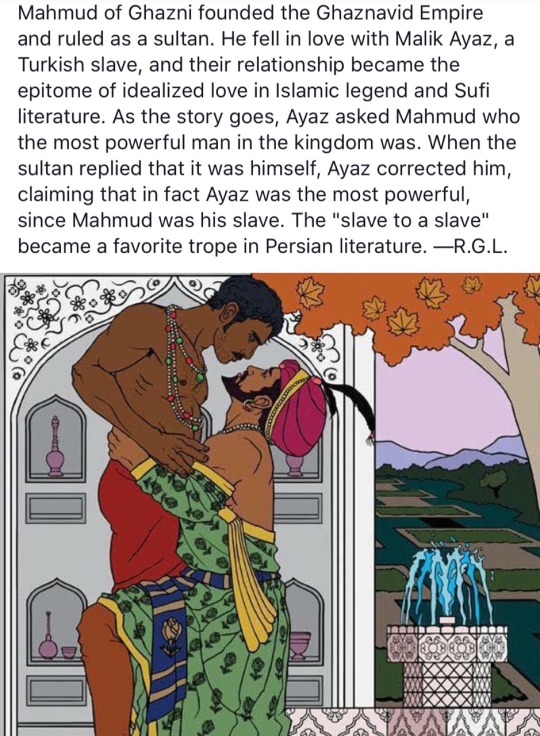
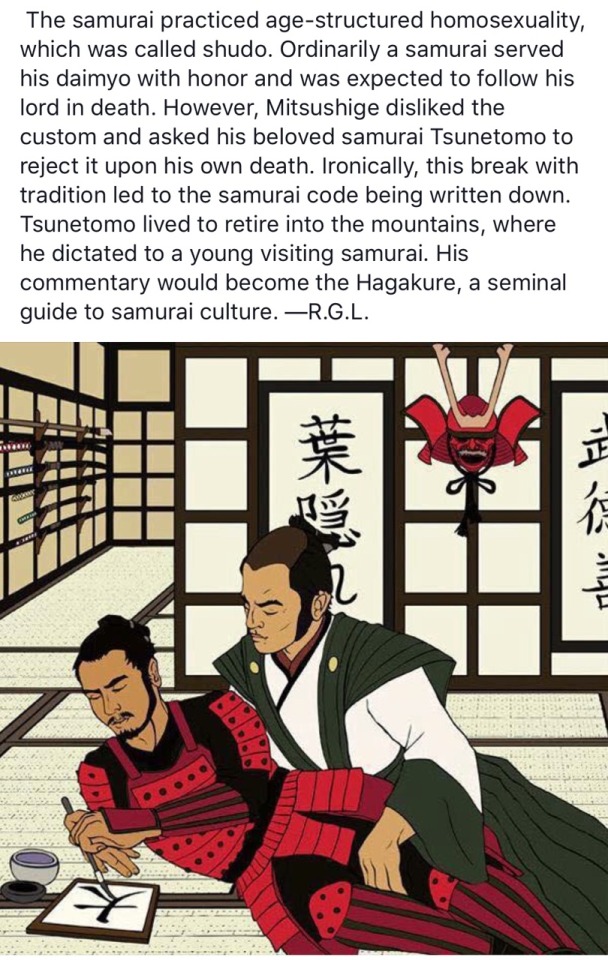
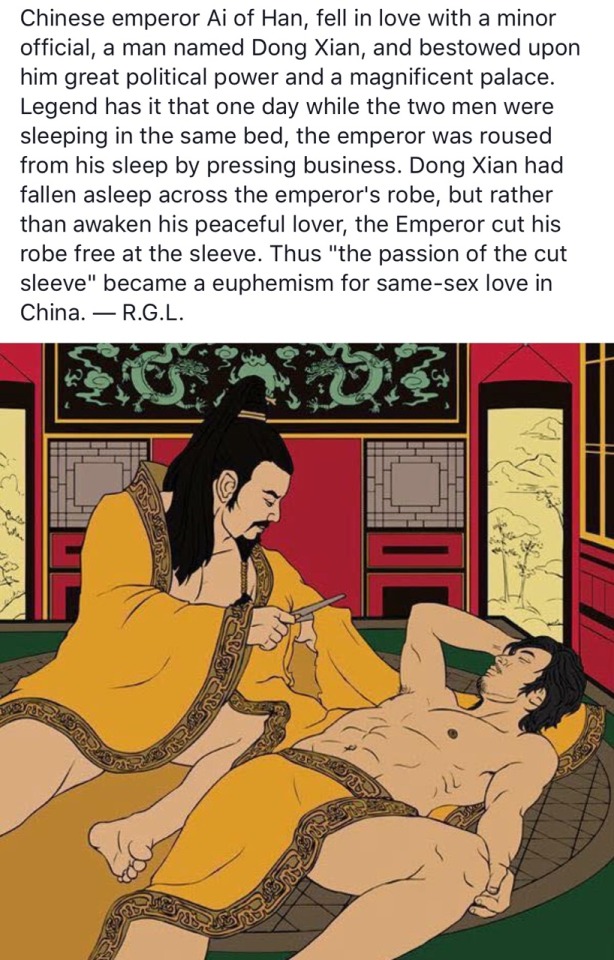
We Exist- we go waaaaaay back
164K notes
·
View notes
Text
I feel like it’s kind of lost on many people that „Don’t use modern labels on historical people“ and „Queer people didn’t exist in history“ are two completely different things. “Don’t use modern labels” simply means that it’s important to highlight queer people in history, their concepts of their own sexualities and the historical and social context. I have said this before and I still believe it: I think you mean well by calling historical people gay, lesbian or bi but I also think you’re actually harming your cause by forcing this modern concept on historical people and taking away the chance to learn about and understand their own concepts and how they themselves thought of their sexualities. To say it bluntly: Forcing a modern concept of sexuality on historical people or even denying there were different concepts of sexuality in different historical epochs in the first place is erasing a big part of LGBTQ history.
People have always tried to make sense of sexuality and attraction just like we do today and it’s honestly so important to inform yourselves on how people thought of sexuality and same gender attraction in the 17th or 18th or 19th century and not just call them gay or bi and call it a day. That’s were the really important queer history is: In self-conceptions and social contexts and progress and the development and advancing of concepts of sexuality until this very day.
Also I’m sure that should someone say to you: “They didn’t have a concept of homosexuality so there were no queer people” you have a better chance of educating them by saying “They might not have known the modern concept, but same gender attraction has always existed, there were always concepts of sexuality and same gender attraction, even though they differed from ours” than insisting “But XY was clearly gay!”
Tl;dr: “There were different concepts of sexuality in history and it’s important to learn about them to truly understand queer history instead of just forcing our modern one on historical people.” =/= “Queer people didn’t exist in history.”
This isn’t about erasing queer people from history. It’s about the opposite: Highlighting queer historical people, their self-conceptions, their lives, their social context and their impact on queer history.
PS: Before this argument comes up again: Of course calling historical people “straight” is just the same. We shouldn’t do that either since “heterosexuality” is also a concept of sexuality that plain and simple did not exist until the late 19th century. This argument needs to go already.
567 notes
·
View notes
Photo
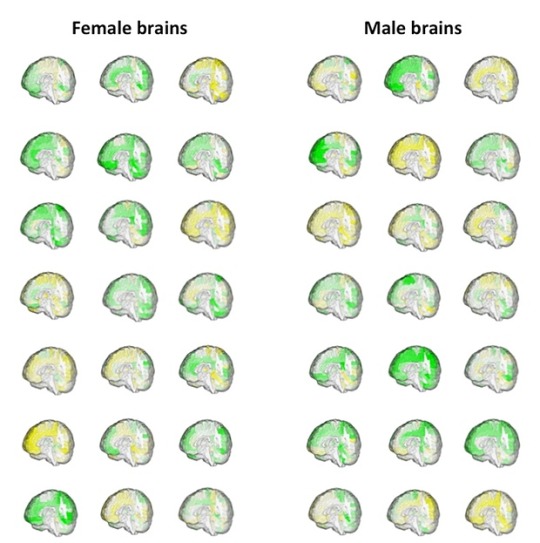
Male and female brains aren’t wired differently
New research, published in October in the Proceedings of the National Academy of Sciences, concluded that despite size discrepancy, there’s no functional difference between men’s and women’s brains. “Male” brains and “female” brains simply don’t exist. In fact, there’s significant overlap.
128K notes
·
View notes
Text
So apparently last year the National Park Service in the US dropped an over 1200 page study of LGBTQ American History as part of their Who We Are program which includes studies on African-American history, Latino history, and Indigenous history.
Like. This is awesome. But also it feels very surreal that maybe one of the most comprehensive examinations of LGBTQ history in America (it covers sports! art! race! historical sites! health! cities!) was just casually done by the parks service.
244K notes
·
View notes